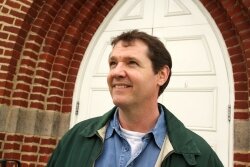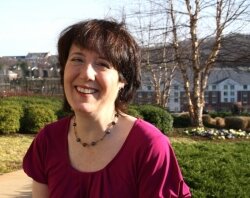Fiction winners: Lawyers dominate in Grisham's short-story picks
In Hollywood, everybody has a screenplay. In Charlottesville, apparently everybody has a short story, at least judging by the 141 people who entered the Hook's 11th fiction contest— nearly double the number of those who participated just three years ago.
We're still trying to analyze whether this is a trend, but the Hook's short-story judge, John Grisham, a former lawyer-turned-writer, picked lawyers-turned-short-story-writers as two of the three winners of this year's contest. Yet none of the winning stories had courtroom scenes.
Maybe it's as simple as the fact that Charlottesville has a plentitude of lawyers— maybe as many attorneys as there are writers in town. Or maybe it's something in the water.
We've had unexpected outcomes in the past, such as 2008, when, during his usual blind reading of manuscripts, Grisham picked former winner Sally Honenberg as both the second- and third-place winner. Wait a minute— she's an attorney, too. And we can boast about 2003 second-place winner Chad Harbach (from the contest's pre-Grisham era), who became a literary success story in 2011 with his book, The Art of Fielding.
This year's winner is a novice— again. When attorney John Davidson captured second-place in 2010 for his story, "First Church," it was the first time he'd ever written fiction. Really. He chalked it up to beginner's luck. Only this year, he scored first-place with his tale, "Hands"— only his second short story.
"A touching story about one of the oddest friendships one can imagine," says Grisham about his winning pick.
Second-place winner Tolly Merrick is a middle school teacher at the Peabody School, and it's obvious he knows well the young voice of his protagonist in "Casting Stones." Says Grisham, "Every little boy has killed a harmless, beautiful animal, and this story captures perfectly the aftermath of one such incident."
Third-place winner Leone Ciporin is a lawyer, and in her story, "Invisible Women," we have to say, we didn't see it coming. "In a world with far too many serial killers, potential victims think they are all invisible," says Grisham.
Merrick and Ciporin's stories will be published later this year. Meanwhile, enjoy Davidson's "Hands."
Meet John Davidson
Any would-be writer with a day job knows this: It's awfully darn hard to find time to write. Especially with your own law firm and three active children. "It's bonkers," says John Davidson, who also coaches youth soccer, football, baseball and his personal favorite, wrestling.
Davidson has had the storytelling bug pretty much all his life. His application essay to UVA Law School was a poem. And that's also the medium he used to propose to his wife. As the first college grad in his family, he'd accumulated debt with his academic scholarships, and after graduating law school, he went straight to work for top-tier firm McGuire Woods.
Two years ago, it was a sick day from the High Street law office bearing his name that gave Davidson time to knock out a short story the day before the deadline, and his second-place finish inspired him to start that novel he'd always wanted to write.
Maybe it's a deadline thing with Davidson. He'd started "Hands" a year ago, but wasn't satisfied with it and put the story away. The morning all fiction entries were due last month, he emailed the story to himself at work and came in at 6am to devote two hours to smoothing it out.
"This one had been in my head a long time," says Davidson of his story of a Vietnamese refuge and a former pitcher in the segregated Negro baseball leagues.
"I have lots of stories," he admits. "The only time I get to think about them is on the tractor."
Davidson says the latest win has reinvigorated him. "I've already gotten 50 pages done on the novel since Hawes [Spencer, the Hook editor] called me," he says.
And he already knows what he's doing with his winnings: "It's all going to the Carson Raymond Foundation," says Davidson. That's a charity he helped launch, and that's where his last prize money went.
And it sort of ties in with a theme in Davidson's stories— and we suspect in his life. "It's all about loving each other," he says.
Meet Tolly Merrick
 Tolly Merrick considers the nature of fiction and nonfiction. While taking a class at the Curry School on how to teach high school students English and having to write every morning for the class, Tolly Merrick had an epiphany: "I'd been teaching English for 16 years, but I hadn't written any fiction."
Tolly Merrick considers the nature of fiction and nonfiction. While taking a class at the Curry School on how to teach high school students English and having to write every morning for the class, Tolly Merrick had an epiphany: "I'd been teaching English for 16 years, but I hadn't written any fiction."
Baltimore-born Merrick was an English major in college, and with a master's in psychology, his early work was in therapy. "I liked the didactic part of counseling," he says, but he decided to get involved earlier in the developmental process.
"I got into teaching and loved it," says Merrick. "Working with 15- and 16-year-olds is more refreshing, more challenging, more promising."
He say that his story, "Casting Stones"— the one about the accidental killing— is largely autobiographical and told amid a forced apology with a backdrop of divorcing parents
"You have a Y[oung] A[dult] voice," Merrick says he's been told about his writing. Maybe that's from hanging around all those young adults he teaches, as well as his own three sons.
And Merrick has a lot of writing in his future, as he's now working on an MFA in creative writing from Queens University in Charlotte. "Casting Stones" was an early piece he'd submitted, gotten feedback on, and then put away for a year. His dissertation will be a novel-length piece.
"I don't want to base all my fiction on autobiography," he says, "but I've got some stories."
Meet Leone Ciporin
 Leone Ciporin moderates a book fest panel-- Crime Wave: High Body Count at 2pm March 24 at the Omni. How appropriate: third-place Hook fiction winner Leone Ciporin was at a WriterHouse meeting when she got the phone call that she was a winner. WriterHouse has certainly contributed plenty of short story winners over the years, and actually, it was founded by 2008 winner Christy Strick.
Leone Ciporin moderates a book fest panel-- Crime Wave: High Body Count at 2pm March 24 at the Omni. How appropriate: third-place Hook fiction winner Leone Ciporin was at a WriterHouse meeting when she got the phone call that she was a winner. WriterHouse has certainly contributed plenty of short story winners over the years, and actually, it was founded by 2008 winner Christy Strick.
"I was thrilled," says Ciporin. "They were thrilled."
Ciporin, public affairs manager at State Farm insurance, is not a novice writer. "When I was eight years old, I wrote Chatterbox the Talking Monkey," says Ciporin, who still has the manuscript.
Although she was a Russian studies major at Yale and then studied law at Georgetown, she never abandoned her desire to write. In the past 15 years, she has gotten serious about it with four mini-mysteries published in Woman's World magazine, and has stories in a couple of Sisters in Crime anthologies.
"I write mysteries because I read mysteries," explains Ciporin, who had been working on "Invisible Women" for several years before getting help with the clues at a writer's workshop in Key West, Florida.
Now, she's working on a novel set in the Brandywine Valley in Pennsylvania, not far from where she grew up in northern Delaware.
"I wanted a little distance from Charlottesville so I can make up what I want," she says.
As for her winnings, she's already planning on funneling them into her writing— with a class at WriterHouse.



2 comments
Somebody really likes the word gotten.
Lawyers tend to cluster together, they know how the general public feels about them .